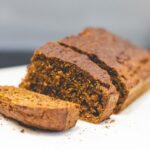Croissants are not safe for dogs but, if they are plain, they should not be toxic. It’s best to avoid feeding this food as a treat. Croissants are quite high in fat and may have toxic ingredients, like chocolate or Nutella, mixed in the pastry.

Caution: This food is generally considered risky by the veterinary community. Dogs should not eat this food and should be monitored for adverse effects.
| Food Safety | Unsafe, best to avoid |
| Nutritional Issues | High-fat content, toxic ingredients, sugar, yeast |
| Potential Risks | Potential poisoning, allergic reaction, weight gain, obesity |
| Symptoms | Upset stomach, abdominal distress (considering a plain croissant) |
How Many Croissants Are Bad for Dogs?
A bite of a plain croissant is unlikely to cause too much harm to a medium or large dog. However, a small dog may experience abdominal pain or gastrointestinal issues even if they had as little as a full bite.
Yes, most pastries and baked goods contain butter, but croissants are loaded with it. If the croissants you buy are from a local bakery, they likely make it the right way: extra butter and French butter (instead of English). Which, you guessed it, is way more fattening.
Common Croissant Ingredients
Different types contain varying ingredients. However, the primary ingredients remain the same:
Eggs: Eggs are safe for dogs to consume as long as they are not allergic and are eaten cooked without seasoning.
Milk: Some dogs are lactose intolerant, and consuming milk can trigger allergic reactions.
Butter: A croissant is a layered pastry, and each layer has a chock-full of butter. Butter is very high in fat and should not be given to dogs.
Sugar: High sugar content can harm your dog’s health and cause dental issues, tummy issues as well as weight gain.
Frequently Asked Questions
-
No, dogs cannot eat almond croissants. In fact, it is best to avoid all types of croissants and give your dog something healthier instead.
-
Butter is not toxic to dogs but can be quite unhealthy due to its high-fat content. Regular consumption of bread can cause many health issues for your dog.
-
Yes, dogs can eat bread. However, it can only be given in small amounts if your dog isn’t allergic. Also, plain white bread is the best option among various types of bread.







